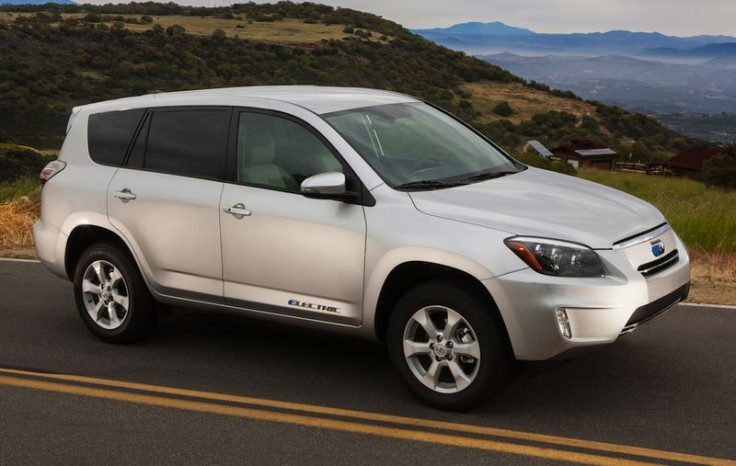Toyota Electric RAV4 Recall: Tesla Motors Components Suffer Software Issue, Causing Car To Shift To ‘Neutral’ Unexpectedly

Toyota’s announcement that about 110,000 of its vehicles in the U.S. need to be fixed would have been routine in an industry that’s issued safety recalls covering more than five million vehicles since the start of the year. But among the cars Toyota says have potentially hazardous issues are nearly 2,500 Toyota RAV4 electric crossovers containing a software glitch in parts supplied by Tesla Motors.
“Components in the Electric Vehicle Traction Motor Assembly, which is part of the propulsion system, may cause the vehicle to shift to neutral due to a software issue,” Toyota’s U.S. subsidiary said late Wednesday. “This condition will also trigger a ‘Check EV System’ warning message on the instrument panel and turn on a malfunction indicator lamp. If the vehicle shifts to neutral, this will result in a complete loss of drive power, which can increase the risk of a crash.”

Tesla supplied Toyota with the RAV4 EV’s electric propulsion system from 2012 until the $50,000 crossover was discontinued last year after sales failed to gain traction. Though the problem affects only a small number of vehicles, flaws in Tesla’s technology pose a significant risk to the 11-year-old Fremont, California, boutique luxury electric-car maker. Tesla has supplied powertrain systems and components for Daimler’s Smart Fortwo and Mercedes-Benz's A-Class electric cars. It also continues to be a supplier for the Mercedes-Benz B-Class EV. In Tesla’s 2014 annual report released in late February, the company listed recalls of its powertrain systems as a risk to the company’s future profitability.
“Our vehicles are highly dependent on software to operate,” the company said in its annual report's risk statement. “Software products are inherently complex and often contain defects and errors when first introduced, and changes to software may have unexpected effects.”
Tesla investors appeared to shrug at Toyota’s recall. Tesla shares were down a slight 0.18 percent in Thursday morning trading, to $193.40. The company announced Wednesday that it has extended its resale value guarantee to 11 European countries. The deal allows customers to sell their leased Tesla cars after 36 or 37 months, a move aimed at boosting Tesla Model S leases in Europe.
Toyota made the recall announcement about the RAV4 EV problem as part of a recall notice that included a separate problem affecting more than 100,000 2015 Camry, Camry Hybrid, Highlander and Highlander Hybrid vehicles. A manufacturing error may have damaged a circuit board for the electric power steering. The problem can make the cars more difficult to steer at low speeds, increasing the chances of accidents.
Here are all of the other Toyota auto safety recalls since the start of the year, through March 5:
-- More than one million 2003 and 2004 model year Toyota Corolla and Corolla Matrix subcompact cars, Toyota Avalon full-sized sedans and Pontiac Vibe hatchbacks whose air bags and seat-belt pretensions might deploy inadvertently due to an electrical flaw. (The Vibe was produced under a Toyota-GM joint venture that ended in 2010.)
-- More than 51,000 Toyota Avalon full-sized sedans (2011 and 2012), to fix an electrical short of the subwoofer speaker in the vehicle’s trunk. The short poses a fire risk.
-- Nearly 5,000 Prius V hybrid cars (2014 and 2015), to fix the passenger-side air bag that might not deploy.
-- More than 1,100 RAV4 crossovers (2013 to 2015) equipped with accessory trailer lights, to fix a problem that could cause the rear trailer lights to turn off, posing a nighttime accident risk.
-- 226 Toyota Yaris subcompact cars (2015), to tighten rear-axle bolts that might loosen over time, causing the wheel to lock up or damage the rear brakes.
-- 116 FJ Cruiser SUVs (2014), to fix an inadequate weld on the steering shaft that could fail, causing a loss of steering control.
-- Eighteen Toyota Tacoma pickup trucks (2015), which may have had the wrong tires and wheels put on the vehicles. The affected cars have tire-pressure instructions on tire placards that inform users to inflate the tires beyond safe levels.
© Copyright IBTimes 2025. All rights reserved.






















